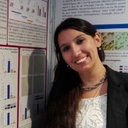
Agata CeveyUniversidad de Buenos Aires | UBA · Institute of Biomedical Research in Retroviruses and AIDS (INBIRS)
Agata Cevey
Doctor of Biochemical Chemestry
About
20
Publications
1,034
Reads
How we measure 'reads'
A 'read' is counted each time someone views a publication summary (such as the title, abstract, and list of authors), clicks on a figure, or views or downloads the full-text. Learn more
358
Citations
Publications
Publications (20)
Introduction
Tuberculosis (TB) is a major health problem characterized by an immuno-endocrine imbalance: elevated plasma levels of cortisol and pro- and anti-inflammatory mediators, as well as reduced levels of dehydroepiandrosterone. The etiological agent, Mycobacterium tuberculosis (Mtb), is captured by pulmonary macrophages (Mf), whose activatio...
Chronic cardiomyopathy is one of the most relevant outcomes of Chagas disease associated with parasite persistence and exacerbated inflammatory response. Fenofibrate, a third generation fibric acid derivative and peroxisome proliferator-activated receptor-α ligand, is involved in the regulation of inflammatory response. However, the participation o...
Chronic Chagas disease cardiomyopathy (CCC) is the most important clinical manifestation of infection with Trypanosma cruzi (T. cruzi) due to its frequency and effects on morbidity and mortality. Peripheral blood mononuclear cells (PBMC) infiltrate the tissue and differentiate into inflammatory macrophages. Advances in pathophysiology show that mye...
Benznidazole (Bzl), the drug of choice in many countries for the treatment of Chagas disease, leads to parasite clearance in the early stages of infection and contributes to immunomodulation. In addition to its parasiticidal effect, Bzl inhibits the NF-κB pathway. In this regard, we have previously described that this occurs through IL-10/STAT3/SOC...
IL-10 is an anti-inflammatory cytokine that plays a significant role in the modulation of the immune response in many pathological conditions, including infectious diseases. Infection with Trypanosoma cruzi (T. cruzi), the etiological agent of Chagas disease, results in an ongoing inflammatory response that may cause heart dysfunction, ultimately l...
We studied the role of Gal-3 in the expression of alternative activation markers (M2) on macrophage, cytokine expression and fibrosis through the temporal evolution of healing, ventricular remodeling and function after myocardial infarction (MI) in mice. Male C57BL/6J and Gal-3KO mice were subjected to permanent coronary artery ligation or sham for...
Chagas disease is caused by Trypanosoma cruzi infection and represents an important public health concern in Latin America. Macrophages are one of the main infiltrating leukocytes in response to infection. Parasite persistence could trigger a sustained activation of these cells, contributing to the damage observed in this pathology, particularly in...
Background
Myocardial infarction (MI) is a dynamic process that leads to ventricular remodeling (VR) and largely to heart failure (HF). Previous studies established that Galectin-3 (Gal-3) is highly increased in the infarct zone from the beginning of MI and also that it is a prognostic marker of HF.
Purpose
We aimed to study the effects of genetic...
Background and aims:
Epicardial adipose tissue (EAT) is a visceral AT, surrounding myocardium and coronary arteries. Its volume is higher in Type 2 diabetic (DM2) patients, associated with cardiovascular disease risk. Lipoprotein lipase (LPL) hydrolyses triglycerides (TG) from circulating lipoproteins, supplying fatty acids to AT, contributing to...
Anti-parasitic treatment for Chagas disease mainly relies on benznidazole, which is virtually the only drug available in the market. Besides its anti-parasitic effects, benznidazole has anti-inflammatory properties. In this work we studied the mechanisms involved in the latter, demonstrating the participation of the IL-10/STAT3/SOCS3 pathway. To ac...
Lipoprotein lipase (LPL) and endothelial lipase (EL) are involved in lipoprotein metabolism. In insulin‐resistance, their behavior is altered. Peroxisome proliferator‐activated receptors (PPAR) and apoproteins (apo)CII and CIII could be partly responsible for these alterations. To evaluate this response, we assessed Lpl and Lipg expression, protein...
Trypanosoma cruzi infection induces an intense inflammatory response in diverse host tissues. The immune response and the microvascular abnormalities associated with infection are crucial aspects in the generation of heart damage in Chagas disease. Upon parasite uptake, macrophages, which are involved in the clearance of infection, increase inflamm...
Trypanosoma cruzi induces serious cardiac alterations during the chronic infection. Intense inflammatory response observed from the beginning of infection, is critical for the control of parasite proliferation and evolution of Chagas disease. Peroxisome proliferator-activated receptors (PPAR)-α, are known to modulate inflammation.
In this study we...
Trypanosoma cruzi, the etiological agent of Chagas' disease, causes an intense inflammatory response in several tissues, including the liver. Since this organ is central to metabolism, its infection may be reflected in the outcome of the disease. 15-deoxy-Δ12,14 prostaglandin J2 (15dPGJ2), a natural agonist of peroxisome-proliferator activated rece...
Chagas disease, caused by Trypanosoma cruzi, is the main cause of dilated cardiomyopathy in the Americas. Antiparasitic treatment mostly relies on benznidazole (Bzl) due to Nifurtimox shortage or unavailability. Both induce adverse drug effects (ADE) of varied severity in many patients, leading to treatment discontinuation or abandonment. Since dos...
Trypanosoma cruzi, the etiological agent of Chagas' disease, induces a persistent inflammatory response. Macrophages are a first line cell phenotype involved in the clearance of infection. Upon parasite uptake, these cells increase inflammatory mediators like NO, TNFα, IL-1β and IL-6, leading to parasite killing. Although desired, inflammatory resp...
Trypanosoma cruzi (T. cruzi), the etiological agent of Chagas' disease, causes cardiac alterations in the host. Although the main clinical manifestations arise during the chronic stage, the mechanisms leading to heart damage develop early during infection. In fact, an intense inflammatory response is observed from acute stage of infection. Recently...




































































